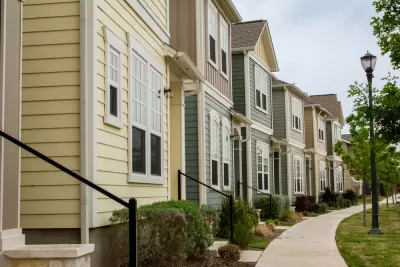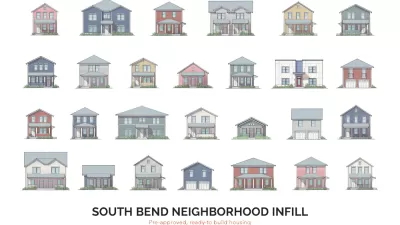The Washington Post examines "missing middle" housing as a solution for retaining millennials in cities and interior suburbs. There is still some question, however, about whether millennials are actually leaving urban areas.

"Cities and close-in suburbs looking to the future see a troubling trend: The millennials who rejuvenated their downtowns over the past decade are growing older and beginning to leave," writes Katharine Shaver.
The response of some cities to this perceived threat, according to Shaver, are "the kinds of homes that might be more familiar to millennials’ great-grandparents: duplexes, triplexes, bungalows, rowhouses with multiple units, and small buildings with four to six apartments or condos."
The article focuses specifically on the market case study provided by Washington, D.C., quoting Yolanda Cole, chair of the local chapter of the Urban Land Institute, and Art Rodgers, senior housing planner for the D.C. Office of Planning, among others. The article also touches on the experience of Nashville and Vancouver, British Columbia in experimenting with the missing middle.
As to whether millennials are actually fleeing more urban areas as the article assumes, "Fred Selden, planning director for Fairfax County in the Northern Virginia suburbs, said he hasn’t seen an exodus of millennials from the county’s more urban areas. But he senses the uncertainty in his profession."
FULL STORY: Cities turn to ‘missing middle’ housing to keep older millennials from leaving

Alabama: Trump Terminates Settlements for Black Communities Harmed By Raw Sewage
Trump deemed the landmark civil rights agreement “illegal DEI and environmental justice policy.”

Study: Maui’s Plan to Convert Vacation Rentals to Long-Term Housing Could Cause Nearly $1 Billion Economic Loss
The plan would reduce visitor accommodation by 25% resulting in 1,900 jobs lost.

Planetizen Federal Action Tracker
A weekly monitor of how Trump’s orders and actions are impacting planners and planning in America.

Wind Energy on the Rise Despite Federal Policy Reversal
The Trump administration is revoking federal support for renewable energy, but demand for new projects continues unabated.

Passengers Flock to Caltrain After Electrification
The new electric trains are running faster and more reliably, leading to strong ridership growth on the Bay Area rail system.

Texas Churches Rally Behind ‘Yes in God’s Back Yard’ Legislation
Religious leaders want the state to reduce zoning regulations to streamline leasing church-owned land to housing developers.
Urban Design for Planners 1: Software Tools
This six-course series explores essential urban design concepts using open source software and equips planners with the tools they need to participate fully in the urban design process.
Planning for Universal Design
Learn the tools for implementing Universal Design in planning regulations.
Caltrans
Smith Gee Studio
Institute for Housing and Urban Development Studies (IHS)
City of Grandview
Harvard GSD Executive Education
Toledo-Lucas County Plan Commissions
Salt Lake City
NYU Wagner Graduate School of Public Service





























